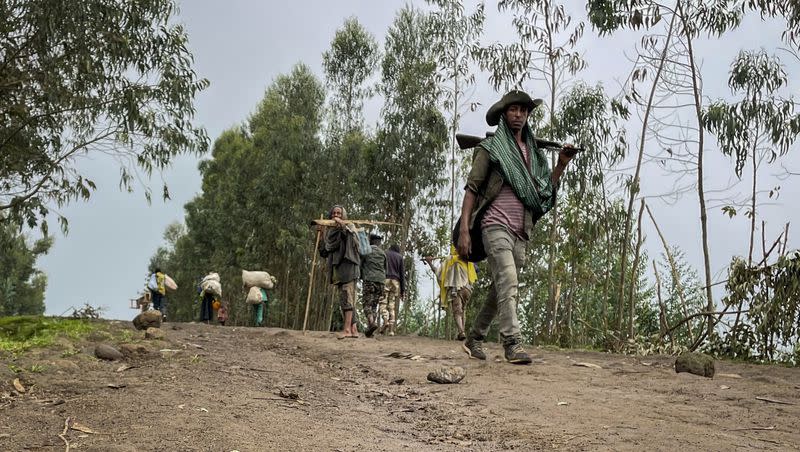Dozens of Ethiopian civilians killed in door-to-door searches for ‘rebels’

In spite of a peace agreement from November 2022, there continue to be clashes and killings in the Amhara region of Ethiopia. Earlier this month, a local rights group said dozens of people were killed, prompting the United States to call for an investigation.
U.S. Ambassador to Ethiopia Ervin Massinga shared his concern on X: “The U.S. government is deeply concerned by reports of targeted civilian killings. ... We call for unfettered access by independent human rights monitors as well as an impartial investigation to ensure the perpetrators are brought to justice.”
#MessagefromAmbassador pic.twitter.com/uTrZq8eXN7
— U.S. Embassy Addis (@USEmbassyAddis) February 9, 2024
As Massinga points out, the most recent killings follow numerous other reports of violations and abuses that have followed the peace agreement of 2022. There have been multiple reports of rape, human trafficking and extrajudicial killings, including 852 cases of rape reported to the Tigray Health Bureau in the two months immediately following when the peace deal was signed.
Related
Last April, a rebellion broke out when the Ethiopian government tried to dissolve local forces and absorb them into the Ethiopian Army, reports The Associated Press. In August, a militia group known as the Fano, which had previously been aligned with the nation’s army, launched a surprise assault, capturing towns across Amhara. Clashes have been ongoing since then.
Compounding the misery, a massive grain theft scheme led multiple international organizations, including the United States Agency for International Development, to suspend operations until satisfactory safeguards were put in place. Grain distribution via USAID did not resume until November.
On Feb. 6, the Ethiopia Human Rights Council said it received information “showing that massive human rights violations were committed” during fighting in Merawi on Jan. 29 between the Fano and the Ethiopian army. Following the fighting, the Ethiopian army began conducting house-to-house searches, looking for Fano supporters and killing people they thought were suspicious. The BBC confirmed that there were at least 45 victims, including a pregnant woman.
On Feb. 23, a drone airstrike in the region killed at least 15 more, including children and the elderly, some of them returning home from a baptism of a child. A priest told Reuters they first heard an explosion, then saw smoke, dust and dismembered bodies. He believes the death toll is “significantly higher” than 15. Reuters has not been able to independently verify the accounts and video shared with them.
The Ethiopian military are the only ones to use drones during the fighting — and they have used them extensively, according to the state-appointed Ethiopian Human Rights Commission, or EHRC.
The commission has documented the deaths of at least 81 civilians that it said were killed in drone strikes or extrajudicial killings by government security forces. The militiamen are not known to have any air assets, reports Reuters.
The state of emergency put into place in August was extended on Feb. 2 by the Ethiopian government for four additional months. The state of emergency gives the government sweeping powers to arrest suspects without a court warrant, impose curfews, prevent freedom of movement and ban public assemblies or associations.
On Feb. 19, Amnesty International released a statement demanding that the Ethiopian government “must stop resorting to old tactics of denying fundamental rights under the guise of emergency laws.”
They must uphold the country’s national laws and international human rights obligations by either pressing charges or releasing everyone detained under the state of emergency, including high-profile politicians and journalists.
“Ethiopians face another armed conflict in the Amhara region, a major humanitarian crisis in Tigray, a dire security situation in Oromia and rampant impunity nationwide. The role of the media and the right to freedom of expression are more vital than ever,” said Tigere Chagutah, Amnesty International’s regional director for eastern and southern Africa.
The Ethiopian government has no comment.
Holly Richardson is the editor of Utah Policy

